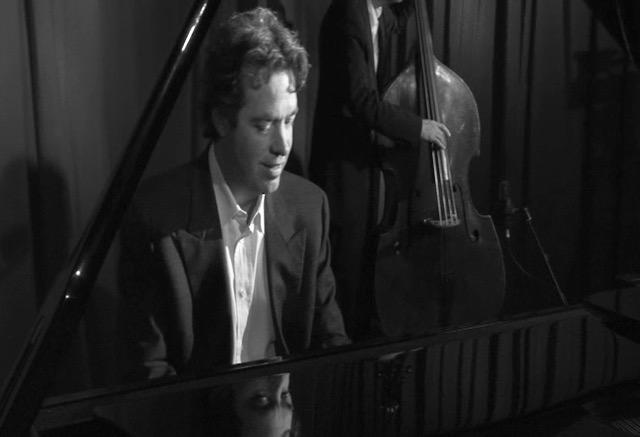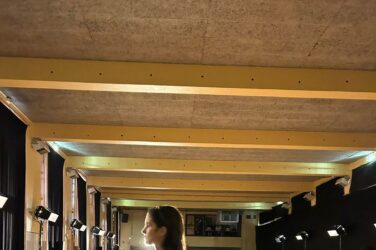Musician and composer Mark P. Skylar discusses his music career, life and living in Paris with E&M‘s Salomé Melchior.
Salomé: What does music mean to you?
Mark P. Skylar: I consider music to be an art form capable of touching the soul. Music is a means to pass into a spiritual realm. It has an effect on the musician and the listener. Music has the potential to move, alter or enhance emotions. The process of learning music requires time, discipline and patience. With enough persistence a sense of accomplishment will be achieved. Though music is never mastered. Music is infinite, and it’s an intrinsic part of life.
Salomé: If music were an element, what would it be, fire, water, earth, air…?
Mark P. Skylar: As an element, music can be fire representing heat and energy. There is also the element of water. It is a necessary component of music giving it fluidity that creates a stream of consciousness allowing it to bubble or overflow with energy. The element of earth is an important part of music giving it geometric properties and stability. Without air, music would lose its lightness, independence, and poesy.
Salomé: As an American living in Paris for many years, what are the key transformations that you discern in this city of lights?
Mark P. Skylar: I would say that, over time, live music is less prevalent now than when I first arrived. The public is less apt to listen to live music, which I attribute to the advances in information technology. This has greatly altered the way most people conduct their daily lives. A good example is that anyone can be in their living room or elsewhere and have the convenience of downloading an array of music. Along with the advantages of IT, there has also been a negative impact on the music profession. Now, music is ridiculously inexpensive or practically free through simply being able to download it.

Salomé: Do places inspire you to compose in a certain way? I think about Italo Calvino’s quote, which says something like: ‘one does not enjoy a city’s couple of marvels, but the answer that a city gives to one of your questions’?
Mark P. Skylar: Absolutely, living in a beautiful city such as Paris is certainly inspiring. Though many places can be inspiring whether one would be walking through a forest, on a mountain range, or watching a sunset by the seaside. I also have a tendency to believe living in different places and meeting other individuals with different backgrounds broadens one’s horizons and can help one mature. In my case, I believe this has been a positive influence on my music. Though my greatest influences and inspiration in music were from those who I met during my formative years in Boston.
Salomé: What state of mind are you in when you compose? Do you feel isolated or interconnected with the environment that surrounds you, the place you live in? Do you seek to consolidate a creative bubble that somehow communicates with something larger than you and than life?
Mark P. Skylar: I’m in a frame of mind similar to being in a state of meditation and try to avoid the thoughts of mundane responsibilities. While writing or composing, being in solitude is the most ideal. There are moments when ideas pop up simultaneously and if there are any distractions in my surroundings, thoughts will quickly be forgotten as easily as they appear. Sometimes, you don’t know where ideas come from; they are suddenly there and come to find you. The beauty of improvisation when playing jazz music is spontaneity. It’s magical. It’s there; it passes through you from the universe.
Salomé: Could you please tell us about your beginnings as a musician in Paris? In which jazz bars did you start to play in?
Mark P. Skylar: Well, there was certainly no red carpet treatment when I arrived. Though through a little persistence I eventually found work. I was the house pianist at a private English club and was quite amused meeting some of the celebrity guests. My favourite place to perform were the private parties at the Ritz. My two favourite pianos (frequently tuned) to play on were at the US Embassy in Paris and the one on French National television. I always enjoyed the musical intimacy of a trio playing to an audience in small clubs. The least amusing situation attributed to weather conditions was at an outside festival in southern France with a sweltering heat of 38°C. I always had a great appetite to learn and face the challenges in my profession. I believe when it comes to different musical art forms; it is crucial to keep your integrity and hold true to your artistic personality.

Salomé: How did you experience the pandemic? Did it offer you a space to create even more or differently than before?
Mark P. Skylar: Unfortunately, live music came to a halt. Otherwise, I did take advantage of the time and spent a lot of it composing classical music, something I am still continuing.
Salomé: Could you please tell us about your recent book “My daughter taught me how to play the piano”?
Mark P. Skylar: This actually happened rather spontaneously on one afternoon while my daughter at the age of four was struggling along with the piano. I thought to myself “why is she learning such a simple arrangement when she could just as easily add a little colour and make it more enjoyable to play?” What she actually did was to help me show her how to play more advanced piano arrangements with her little hands and having fun, but most importantly feeling the sense of accomplishment.
Salomé: Since you write poems too, I’m curious to get an insight into what poetry means to you? Do you search and encounter it on a regular basis? To what extent are poetry and music intertwined in your point of view?
Mark P. Skylar: The birth of my daughter had inspired me greatly and I began to put my feelings into words and music. I don’t consider myself to really be a poet; though I may jot something down from time to time. I’m not always writing poetry or composing music systematically. I have written lyrics for music, which is a challenge – having to make it fit with the melody. You can have great lyrics but they may not necessarily be conducive to good musical phrasing. Also, phrasing in music and poetry do not necessarily correspond with each other.
Many thanks to Mark P. Skylar for his time. Answers may have been edited for clarity and brevity.
An important part of his education in Boston, Massachusetts was largely influenced by the instruction under the renowned jazz pianist Ray Santisi at Berklee College of Music.











Show Comments
Luis Rodriguez
Greetings from Venezuela, I´m so happy to hear such good things about my friend Paul Marks, in this excellent interview, describing the essence of this special person so well connected to life, who seems to be a humble traditional modern artist, but in reality bears an enormous impressive talent and a real love and interest for good music, he´s part of everything that surrounds it, and has proven to belong among the best, and I was lucky to have the privilege and honor to meet him in 1991, when he was doing one of his always fancy Paris gigs, at the Hotel de Crillon, a traditional French palace filled with such sweets sound, when Paul plays he´s declaring real class, without any doubt he´s probably one of the most important American musicians settled in Europe, for many years performing in the best kwon Jazz, blues, stages in Paris, and surely the coolest underground pubs raging those sounds that really touch our souls.
So he knows I´m always really proud and happy about him, knowing he´s doing what he likes, leaving behind what only the few know like you Salomé, the importance of his presence, specially the honest philosophy he´s always preaching to others so wisely, the one of a true natural artist, and a gentleman, a man who respects honors and cherishes life with unique realism.
My respects and ¨Salutations¨to my dear friend, Paul, with my very best wishes and blessings for you and your beautiful family.
I would like to contact y´all, exchange addresses, emails and phone numbers, so we can keep in touch.
Thank-you
Sincerely,
Luis Eduardo Rodriguez Fuentes
Comments are closed.